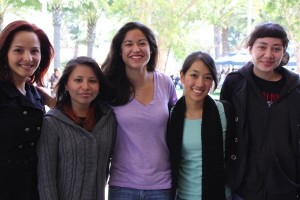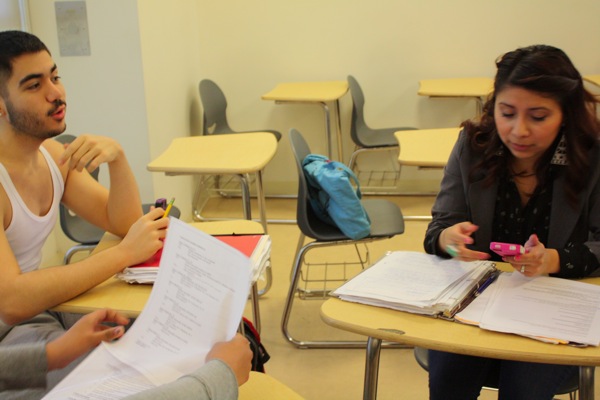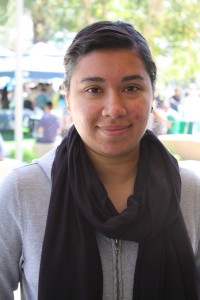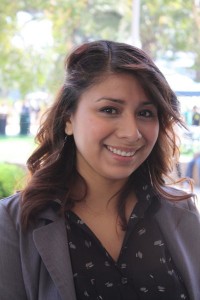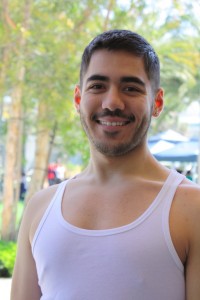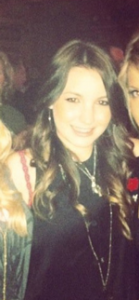“I have always believed that both women and men are equal. Little did I know that equality between men and women was superficial. In the U.S. Constitution there are only mentions of men, and none of women.” Ulices, Roxsana, Gilbert and Rosemary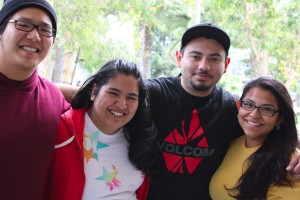
I have always believed that both women and men are equal. Little did I know that equality between men and women was superficial. In the U.S. Constitution there are only mentions of men, and none of women. I learned this matter through my women’s studies class. I’ve learned that there is a new amendment that has been proposed to make both women and men legally equal – the Equal Rights Amendment.
I believe that taking a women’s studies class was beneficial for me because I was able to learn about the inequality that is still present between men and women. If men and women are capable of having the same occupation, shouldn’t they be treated equally and fairly? I’ve always thought about it this way that men and women should be equal in all aspects. I now understand why some women would say that men have it easier, because I can see the difference on how men and women are treated.
This women’s studies class has been an interesting experience since the first day I entered the class. I really didn’t know what I was getting myself into, but once I listened to what the class was about and everything that had to be done, I got scared. Then I realized that I could in fact manage the work and just continued the class. This class has affected me positively because it taught me more about women in my past that I didn’t even know about. All the guest speakers that have gone to class and taken the time to talk to us have shown me that anything can be possible if we set our minds to it.
The days progress as we continue to work for this ERA Education Project and in light of all the recent knowledge that’s been shared with me, my perspective of things has changed. The class has made me more observant of the people around me. Just the other day I found myself making observations of how our society demeans women not because it’s their intent to insult, but because it is the norm.
Growing up with one older and three older male cousins has kept me in a sort of bubble with regards to equality. Not to say I felt men were more capable, but it feels more and more that it’s an actual misconception that they are. The male machismo, at least as I have seen in my family, tends to defend that idea with such vigor that I wonder if it’s because they really believe it or because they are afraid to speak
On my first day I was presented with the question “Are you a feminist?” Not knowing what it really meant, I still answered the question by saying “no”. Femfraggists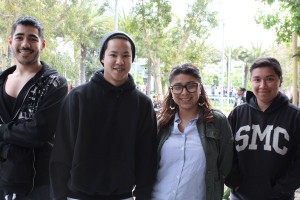
If I was presented with the same question again today – “Am I a feminist?” I would say “yes.” I believe many of us are feminists and we just don’t know it.”
Coming into the semester, I wasn’t sure what I was going to learn. Not being very enthusiastic and just looking for extra units, I was expecting more of a class about learning the history, the importance and roles played by women in history.
On my first day I was presented with the question “Are you a feminist?” Not knowing what it really meant, I still answered the question by saying “no”. I never really considered myself to be a feminist, but at the same time I never really understood what it was, or what it meant to be one. I wouldn’t say it was because of ignorance that I never knew as much as I do now, but instead had to do with not being informed growing up.
From first grade all the way through high school, I never took a women’s history class nor was I ever involved in women’s organizations. It’s been several months since I’ve worked with the ERA Education Project, and every week I seem to be learning more and more as I work on these field assignments. Getting the chance to interview strangers, friends, and even family members has been a great opportunity, because during these interviews I get to share with people, things that I never knew.
What I enjoyed the most while working with the ERA Education Project is that we got to work on a curriculum for elementary students. I found this project great because now, at least these students will have information and knowledge that I didn’t when I was their age. Do I believe in equal rights? Yes I do. If I was presented with the same question again – “Am I a feminist?” I would say “yes”. I believe many of us are feminists and we just didn’t know it.
Why don’t college students vote? Because they don’t know their rights and because they were never taught about the Equal Rights Amendment in high school or primary or secondary school. Brenda Ajanel, Elise Becker, Adriana Magana, Joanne Sampoonachot, Rocia Zuniga
“The difference between the First, Second, and Third Waves is our cultural DNA. Each generation has a drive to create something new, to find that distinctive spark that Silver couldn’t locate that day in D.C.” (Baumgardner and Richards, 129).
Surely, feminism back in the first and second wave was much better known among women. Feminism was more radical in a sense, and it heightened when women started to flood the workplace and move out of the domestic sphere into the social sphere.
Today, feminists are still activists, but their style of approach towards activism can be defined in different fields, whether it’s through comedy tours like Keri Smith, or journalism and filmmaking like Janice Littlejohn. I think that women are all activists of feminism in their professions when they make decisions that involve politics and they are empowered to be independent.
Even the authors of Manifesta agree that fighting for equality doesn’t mean that individuals have to sacrifice their entire lives like Susan B. Anthony did to reap change. Women can find a genuine way to support and advocate for feminism in things that they love or social issues that personally affect them.
Women all struggle with sexism even when they’re not involved in politics. Keri Smith lectured in class that before starting up her own company, she worked for a bigger company that was dominated by male top dogs who sought to only maintain male values. By starting up her own company, she became an activist of feminism because she refused to be oppressed by the decisions of men who didn’t treat her equally, like her fellow male employees.
I want to shed light on why activism is important among the youth generation. In high school, my former U.S. History teacher once told me that he wished more of the youth would rebel against old, traditional and conservative norms. He believed that change was most effective when garnered by the youth because we are next in line in shaping the outcome of our future, and the government and society we wish to live in. He was absolutely right. The youth population is ultimately a minority and we are marginalized in comparison to the rest of the nation. Why is that? Because not enough college students vote when it comes to elections. And why don’t college students vote? Because they don’t know their rights and because they were never taught about the Equal Rights Amendment in high school or primary and secondary school.
Young people are full of enthusiasm, spirit, and connected by social networks like Facebook and Twitter that allow them to voice their opinions. I remember last semester I conducted research on myself to see the level of mediation I was exposed for two weeks. In comparison with high school students and my college peers, I was surprised that their level of mediation was exponentially higher than mine.
A call for change can go viral among the youth because of the tools and technology we are savvy in today. My point is that young people, especially young women are capable of deciding their own fate when it comes to tackling patriarchy but they need to have the resources and information in their academic curriculum in order to do so.
To many people, radicalism is thought of as something negative, intimidating, and a turn off for people to support a cause such as feminism. Radicalism tied to feminism is always affiliated with things like anti-men, lesbianism, or wanting to become men. Not everyone has to use radical tactics to get their point across, but radicalism should not be condemned, but rather acknowledged and appreciated. Sometimes it is necessary to be radical in order to achieve a call for change.
The Equal Rights Amendment: Now Is the Time, an article by Paul Abrams suggests that radicalism might be necessary today when using subtle methods hasn’t seemed to work for over 72 years. Today the Equal Rights Amendment is still not ratified under the constitution and therefore women are not protected equally under the law.
“In Virginia and Texas, they have forced women to have medically-unnecessary ultrasound exams without their consent. The absence of consent violates Nuremberg principles of ethical medical practices, inflicts what the law considers to be an ‘assault’ and, as if that were not enough, forces women to pay for the privilege themselves.” This particular report is a consequence of the ERA not being ratified in the U.S. Constitution. Without the ERA, women are subjected to unequal benefits from pension, tax rates, social security, and being a household mother to their children.
Baumgardner, Jennifer, and Amy Richards. Manifesta: Young Women, Feminism, and the Future. New York: Farrar, Straus and Giroux, 2000. Print.
It’s been two months since we started working with the ERA Education Project and it is still full of surprises and information that we never paid too much attention to. After interviewing younger people, and watching my classmates’ videos as well, what continuously stood out was the lack of knowledge on feminism and the ERA. But more important is that it appears to be strategically set up that way. In this day and age it is becoming more culturally and socially acceptable to not only be okay with sexual inequality, but to perpetuate it as well. From media to legislation, men and women are being taught that women are (for lack of a better word) worthless in comparison to men. In a culture that habitually objectifies and belittles women, we are being taught that it is okay to be disrespected – and in some cases it’s even encouraged.
Take the domestic abuse situation with Rihanna and Chris Brown for example; it was made publicly clear that her ex-boyfriend Chris Brown (who is also a celebrity people may look up to), beat her on numerous occasions, and for a while there was a huge deal in the media about it. What is truly horrifying is what happened when he performed at an award show a year later. Young women tweeted everywhere that they’d let him beat them anytime. Fast forward a few years later and what happened when Rihanna and Brown recorded another song together? It was no big deal, as if nothing had ever happened. Both of these celebrities are sending negative messages to our future generation: beat a woman and there will be no harsh punishment; or get beaten by a man and continue to have a relationship with him. How does this make any sense? What astounds me is that it’s actually gotten this far.
Again, This can be traced back to the lack of knowledge – as there are still people who think men and women are equal under the law! No one can do anything big enough to make a change because there aren’t enough people that know and recognize what is going on. It may sound cliché, but Knowledge is Power. If people (including my classmates and myself) become better informed on the subject, then we can make better choices when it comes to doing something about these issues- because it benefits us all.
There are already many feminists groups and organizations working towards equality for women, yet very little people who show support either because lack of interest, or fear of being patronized by society. The fact of the matter is we need to come together to make changes in order to move forward. After reading a couple of chapters from Grassroots on art and activism, I feel like that is the best way to do so.
Our generation is very visual when it comes to learning and maintaining interest (as seen with the Rihanna example). We would rather watch films and listen to interesting music than read about a subject. I’m not saying this is a good thing, but it can be beneficial when trying to reach out to a younger generation. In a very real way, it is a form of activism. When watching films and documentaries on social, political, and cultural issues, we usually feel a connection with the protagonist that can be used to transcend any differences towards common ground. That common ground can be the confidence to admit to being a feminist or an egalitarian. It can be to work towards passing the ERA and granting women the equal rights they deserve.
This is a huge part of the reason why we are enjoying being a part of this project so much. Even when interviewing people, I feel like I’ve helped in a small way by bringing up such important questions. I hope that at the end of each interview we conduct people leave with those thoughts and questions on their minds and maybe then they’ll bring it up to friends. Then a new cycle will begin- a more positive one!
The one thing the women’s movements all have in common is that they have risen out of political, social, and economic inequities and have taken root through the solidarity of women fighting for the same goals. Although it may seem disheartening that young women today, including us, don’t have a sense of their own history and are a part of a generation that is considered apathetic, learning about women’s stories and experiences gives us a sense of hope. With the backbone of our education in women’s studies, we significantly recognize that we can build on the activist work of our foremothers and not have to constantly “reinvent the wheel,” which can ultimately set us back as a movement.
One aspect of the 2nd Wave of feminism we find most inspiring, is the formation of consciousness-raising groups in the seventies. Despite the efforts of the women activists aiding the Civil Rights Movement, they constantly found themselves being separated from the movement, as it did not escape the patriarchal and hierarchal style of organizations. Thus, women activists began to develop new ways of thinking and new leadership styles that were nonhierarchical. There were no leadership positions in the consciousness-raising groups allowing for everyone’s voices to hold equal value, so the formation of consciousness-raising groups was truly revolutionary. Through the creation of these groups, women began to realize that their stories of oppression and dissatisfaction were not isolated cases. Listening to themselves and to each other’s stories, they began to realize that their lives had many commonalities. This gave rise to their understanding that the injustices in their lives were actually a structural and systemic problem that needed to be addressed. As the most famous and noteworthy words to come out of the 2ndwave: the personal is indeed political.
We are half-way through our sixteen week semester at Santa Monica College and things are starting to get even more demanding, challenging, and down-right insane. Being a student is hard in any situation, especially when, for example, one has to work and/or deal with burdening family issues. Some of us have really started to feel the pressure and have also begun to feel at times overwhelmed and discouraged. In the midst of all this, however, it is extremely important for us to remember that we are so fortunate to be given the opportunity at a higher education. Furthermore, we are even more blessed to have a Professor whose knowledge is being imparted to us in a way that is intelligent, yet relatable and whose work, both inside and outside of the classroom, gives us a prime example of how to put that knowledge to work and good use.
We then should feel absolutely honored to be working on a campaign like that of the ERA Education Project. Reminding ourselves of this honor should help ease the stress that we may feel as students, because at the end up the day, we are a part of something that is so much bigger than ourselves and that is so monumental. The beautiful thing about this amazing opportunity is that we are not only learning so much, but that we also get to share and pass on that knowledge to our family and peers. Most of us did know that the ERA had never been ratified prior to taking this leadership class; however none of us really knew the complete and full gravity of what that meant for women and women’s rights here in the United States. Now that we are continually learning more and more with regards to about equal rights, we feel it is our personal duty to share (through conversation and Facebook!) and to help further educate our family, friends, and fellow citizens, neighbors, and community members.
Currently as young women, we look forward to the future and believe and hope to be lifelong activists in any shape or form and in any capacity possible. Jennifer Baumgardner and Amy Richards say it best in Manifesta when they urge “…to see activism not as a choice between self and community, but as a link between them that creates balance.” We it owe it to ourselves and our community to impart the knowledge we have been so gratefully given to help make the world a better, and more equal place. As part of Baumgardner and Richards’ Thirteen Point Agenda for a Third Wave Manifesta, the last and final point can be considered the most significant, and in this case, the most indicative:
“13. TO PASS THE EQUAL RIGHTS AMENDMENT SO THAT WE CAN HAVE A CONSTITUTIONAL FOUNDATION OF RIGHTEOUSNESS AND EQUALITY UPON WHICH FUTURE WOMEN’S RIGHTS CONVENTIONS WILL STAND.”
GROUP 5/WEEK 3: Rosemary, Gilbert, Roxsana & Ulices
The thing that really shocked me and interested me the most in learning about the women’s rights movement is the persistence of sexism. I expected there to be sexism in traditional society, but I did not expect it to even be present in the counter-culture movements. Learning that a lot of women who joined the movement during the 1960’s, did so as a reaction to what they saw while involved in the civil rights movement really put things in perspective. I think that if more people were exposed to information like this, they would start to see how deep sexism is embedded in the patriarchal society we live in. Sexism being so accepted really made me sick to my stomach. I feel like there has to be a way to change this and make our society good for everyone that lives in it. I can’t believe I never saw it in front of me before, but now I see it everywhere I go. This is why I really like being involved in this ERA Education Project. I feel that I am helping, even in a small way.
FROM A MAN’S PERSPECTIVE, what interests me most about the women’s rights movement, is how obscure it feels. Not to say it’s small, but I think as a guy in a patriarchal society it is very downplayed, although ironically it’s been around for a good while now and probably has more supporters than ever before. That to me is a big indicator of how suppressed the idea of equal rights for women is. Oppressed by society as a whole as if in a sort of blissful ignorance that most people care not to be shaken out of.
I am almost certain men are not aware of it, or at least young men of my generation don’t know the slightest thing about it. I know I didn’t. Flip side of the coin is that just as many women may not be aware of what’s going on and that they don’t have constitutional equal rights. When it comes to civil rights, worker’s rights, gay rights, these ideas are covered day to day. Women’s rights on the other hand are given this side note worth, which to me, says a lot about the day and age we live in.
When it comes down to it I’m very uneducated on the topic, or at least was more so before taking this class. The truth is that’s the key word of the topic – education. People aren’t educated on these topics. They don’t know and we can’t get angry with anyone for not knowing something. But the fact that people simply aren’t taught is frustrating. Therein lies the issue and also the current cause. The ERA Education Project is crucial because so many don’t know the underlying truth.You can’t introduce an amendment to the constitution without knowing what it’s for. Though I will admit in my own personal opinion, that there is less room for debate when it comes to gender equality, but it’s just a matter of fact just as racial discrimination.
Second Post:
In the past couple of weeks this whole new world with women leading the way has been revealed to me. We’ve been getting to know the giants like Susan B. Anthony, Sojourner Truth and Alice Paul, and the “girls next door” like Amy Richards and Jennifer Baumgarden who started the first girls soccer team, or first girl to run for class President in her high school and later went on to write books.
It has also lead me to recognize that feminism, despite the boundaries that still exist today, prevails in almost every woman: from my mother who makes the decision to work and go to school, to my girl friends who pursue careers before marriage. I know feminist men as well, starting with my father who supports my mother in her decisions as well as mine, to my guy friends who have encouraged me to go to school or cheer me on when I snowboard.
The problem here is not the lack of feminism; the problem is the lack of activism.
While women and many men embrace the feminist ideology in their everyday, most are not aware of many of the boundaries and gender discrimination that still exist today. Many people don’t know that the United States Constitution does not guarantee civil and human rights to women that are equal to men. Because I didn’t know who Alice Paul was I also didn’t know that she wrote and proposed the original Equal Rights Amendment (ERA) in 1923. The ERA states “Equality of rights under the law shall not be denied or abridged by the United States or by any state on account of sex.”
It has been nearly 100 years that women have been fighting for civil and human rights and for the last couple of years this brutal battle has been quiet and under the radar! With the 2012 elections at play we have been hearing a lot of talk about women’s issues, but all coming from men! Where are all the women?! Where are all the men and women that are living feminist ideologies? Well they are all around, they are you and me, the problem is that we aren’t politically active. This is supposed to be a democratic government, a system that is governed and run by the whole population under the principle of social equality. That further underlines our problem, the lack of democracy.
At the beginning of this course, I didn’t know what I was getting myself into. I thought it was just a normal women’s studies class that would teach about all the women in history, but it wasn’t so. When I attended the first class it was completely different, but still interesting. Now that I have become more familiar with the whole idea of feminism, it comes to my attention that women aren’t recognized as I thought they were. This whole project that’s going on is for a purpose, not just a class that I am taking, but so much more.
I am extremely ecstatic about taking part in this ERA project. I’m sure there are women in this country who don’t know that women do not have the same rights as men. The ERA Education Project is making people (not just women) aware of this injustice. This class is also teaching us how to develop skills and become a leader. Being able to utilize these skills from a women’s study course is amazing and I believe that a women’s studies class like this should be mandatory around the world. It not only gives one the knowledge of the inequality, but the knowledge that we can do something about it.
Earlier this week, our group researched about the NoH8 campaign. The NoH8 is successful and has reached so many people. It promotes Marriage, Gender, and Human equality through education, advocacy, social media and visual protest. The Noh8 campaign came about thanks to the passing of Prop 8, which banned same sex marriages in California. The brilliant photojournalists Adam Bouska and Jeff Parshely are the founding fathers. Their visually compelling, silent messages are what sets them apart and raises the bar in their quest for human equality. I personally think that people should be allowed to do as they please, as long as they are not hurting themselves or the society in which they dwell.
Like anything foreign to us, Feminism and Activism can be scary, overwhelming, even something entirely unheard of, but as with many new things come change, eye-opening experiences, and even lifelong journeys. This is why, although a bit scared and confused, we embark on this journey to learn and to share women’s history- our history- with those who are willing to listen (and maybe those who aren’t).
Yes, we are currently students and are learning about Feminism and the ERA, but aren’t we all students in one way or another? Aren’t we all constantly learning something new, whether at school, at home, or in life? And believe it when we tell you that there is still much to be learned. It’s much more than the fact that women are not considered equal under the constitution, or the realization that we too perpetuate sexism (the effects of our socialized culture), but most importantly it’s about learning how to move forward towards a more egalitarian society- because that, in a few words, is what feminism is about. It is not about women hating men or men hating women, it’s not about who’s a bitch and who’s angry, it’s about being equal to one another and our actions reflecting that.
Like most things, in order to move forward we must look at and analyze our past, which in the case of feminism can be rather difficult; whether it be lack of interest, knowledge, history, or a patriarchal society that purposely debunks the movement for its benefit. Lucky for us there are many women like Zoe Nicholson, who continue to enlighten, encourage and educate us on the movement and the many ways in which to be a part of it.
Before listening to Zoe, we (like many others) believed that being a feminist, activist, or both, was not only difficult but also out of reach. Listening to her and reading books like Manifesta has taught us that change and commitment can come about in small ways, but should never be seen as anything less than activism.
One of the most important aspects of modern activism is that one doesn’t have to go into it turning your life upside down. In Grassroots, Baumgardener and Richards address this issue that many young activists have today. In their prologue they say, “We are advocating, quite simply, that if you wait until you’re perfect and free of conflicts, you will never change anything in the world” and to quote Zoe Nicholson, “You have to start with what is right in front of you.” This rings incredibly true, for the majority of people don’t know where to start or even how, forgetting that we have the freedom to choose what being an activist and a feminist is to us and that part of our journey still is to figure that out.
-
Categories
-
Articles
-
Calendar
March 2026 M T W T F S S 1 2 3 4 5 6 7 8 9 10 11 12 13 14 15 16 17 18 19 20 21 22 23 24 25 26 27 28 29 30 31 -
Meta

